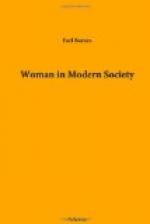Years ago, while discussing education with an English statesman, he asked whom I considered the leaders of education in his country. Knowing his Tory instincts, I replied, “Bradlaugh, Annie Besant, William T. Stead, John Burns and Keir Hardie.” He laughed contemptuously: “Why those people,” he said, “are merely educating themselves in public.” The statement was true and far-reaching; that is what we are all doing in our modern democracies; and that is at the same time our weakness and our glory.
VIII
Woman’s Relation to Political Life
In discussing woman’s right to vote it is well to remember that the right to rule, which is implicit in the right to vote, has always been limited by conditions of birth, residence, wealth, morality or intelligence. Universal manhood suffrage has never yet been achieved, and probably never will be. Under the best Greek conditions, it was only the free-born citizen, residing in his native city state, who voted. In both Greece and Rome, the suffrage was limited to classes defined by social position, wealth or military service. In our modern democracies there have always been limitations of birth, which might be overcome by naturalization; of residence, which could be overcome by living for a certain time in a locality; of wealth, which was supposed to insure a stake in the communal well-being; and of morals and intelligence, which at least shut out criminals, the insane and the imbeciles.
Thus the right to vote is not the same thing as the right to live; and even in a commonwealth founded on ideal justice only those having a stake in the community life, and possessing normal intelligence and morality, will be allowed to rule. In a word, equal suffrage is possible, while universal man or woman suffrage is not.
All through our colonial period women had a large influence in determining community questions, and in Massachusetts, under the old Providence Charter, they voted for all elective officers for nearly a hundred years. Here and there women—like Margaret Brent, of Maryland; Abigail Adams, of Massachusetts; or Mrs. Corbin, of Virginia—put forward their right to participate in the public life around them. But, in 1776, women were not voting, and the Federal Constitution left the matter of determining electoral rights to the several States. They all decided for male suffrage.
The initial impulse to secure suffrage for American women came from Europe. After the Revolution, Frances Wright, a young Scotchwoman, came to America to lecture and write, claiming equal political rights with men. In 1836, Ernestine L. Rose came from Poland and also advocated equal political rights. All the teachings of the American Revolution had favored the idea of human equality; and, as has been pointed out, when, with established peace after the War of 1812, women engaged in anti-slavery, temperance and allied movements, they were driven by the logic of events to demand the suffrage.




